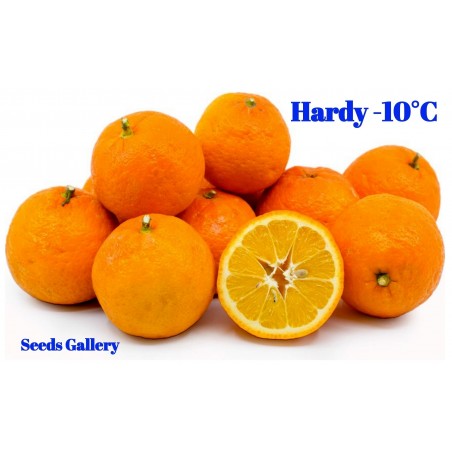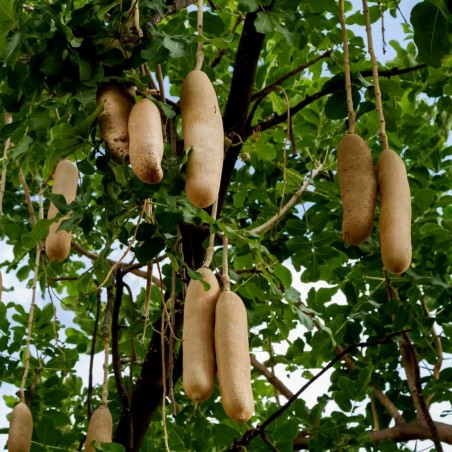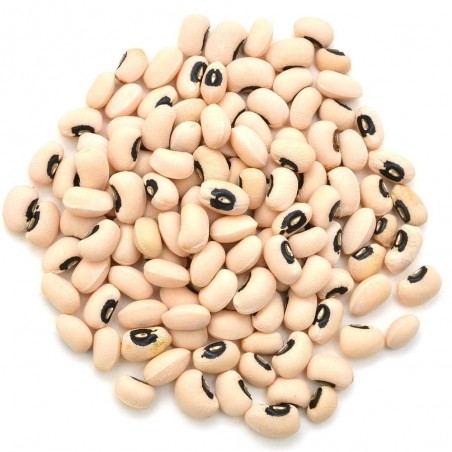
Sausage Tree Seeds (Kigelia pinnata)
Sausage Tree Seeds (Kigelia pinnata)
Price for Package of 5 seeds.
Kigelia is a genus of flowering plants in the family Bignoniaceae. The genus consists of only one species, Kigelia africana, which occurs throughout tropical Africa, from Eritrea and Chad south to northern South
Sausage Tree Seeds (Kigelia pinnata)
Price for Package of 5 seeds.
Kigelia is a genus of flowering plants in the family Bignoniaceae. The genus consists of only one species, Kigelia africana, which occurs throughout tropical Africa, from Eritrea and Chad south to northern South Africa, and west to Senegal and Namibia. Common in India, with many medicinal uses, the species's distribution is most certainly anthropogenic. The sausage tree grows a fruit that is up to 2 feet long, weighs about 15 lbs, and looks like a sausage.
The genus name comes from the Mozambican Bantu name, kigeli-keia, while the common names sausage tree and cucumber tree refer to the long, sausage-like fruit. Its name in Afrikaans worsboom also means sausage tree, and its Arabic name means "the father of kit-bags".
Habitat
It is a tree growing up to 20 m (66 feet) tall and it typically has spreading branches. The bark is grey and smooth at first, peeling on older trees. It can be as thick as 6 mm on a 15-cm diameter branch. The wood is pale brown or yellowish, undifferentiated and not prone to cracking.
Foliage
The tree is evergreen where rainfall occurs throughout the year, but deciduous where there is a long dry season. The leaves are opposite or in whorls of three, 12 to 20 inches (30–50 cm) long, pinnate, with six to ten oval leaflets up to eight inches (20 cm) long and 2.25 inches (6 cm) broad; the terminal leaflet can be either present or absent.
The flowers (and later the fruit) hang down from branches on long flexible stems (2–6 metres long). Flowers are produced in panicles; they are bell-shaped (similar to those of the African tulip tree but broader and much darker and more waxy), orange to maroon or purplish green, and about four inches (10 cm) wide. Individual flowers do not hang down but are oriented horizontally.
The fruit is a woody berry from 12 to 39 inches (30–100 cm) long[3] and up to seven inches (18 cm) broad, but eight inches (20 cm) has been reported.[4] Typically it weighs between 11 and 22 pounds (5 and 10 kg) but occasionally up to 26 pounds (12 kg),[5] and hangs down on long, rope-like peduncles. The fruit pulp is fibrous, containing many seeds.
Species associations
Some birds are attracted to the flowers and the strong stems of each flower make ideal footholds. Their scent is most notable at night indicating that they are adapted to pollination by bats, which visit them for pollen and nectar. The flowers also remain open by day however, and are freely visited by many insect pollinators, particularly large species such as carpenter bees. The fruit are eaten by several species of mammals, including baboons, bushpigs, savannah elephants, giraffes, hippopotamuses, monkeys, and porcupines. The seeds are dispersed in their dung. The seeds are also eaten by brown parrots and brown-headed parrots, and the tree's foliage by elephants and greater kudu (Joffe 2003; del Hoyo et al. 1997). Introduced specimens in Australian parks are very popular with cockatoos.
Cultivation and uses
The fresh fruit is poisonous and strongly purgative; fruit are prepared for consumption by drying, roasting or fermentation (Joffe 2003; McBurney 2004). Kigelia is also used in a number of skin care products. In Botswana, the timber is used for makoros, yokes and oars.
The hard shell (skin) of the fruit can be hollowed out, cleaned, and made into useful, durable containers of varying sizes.
The tree is widely grown as an ornamental tree in tropical regions for its decorative flowers and unusual fruit. Planting sites should be selected carefully, as the falling fruit can cause serious injury to people and damage vehicles parked under the trees.
In Central Kenya, especially among the Agikuyu and the Akamba, the dried fruits are used to make an alcoholic beverage (muratina in Kikuyu, kaluvu in Kamba), which is a core component in cultural events in Central Kenya. The fruit is harvested then split into two along the grain, then dried in the sun. The dried fruit is then treated with bee pollen and honey. The treated fruit (miatine) is then used in fermentation process in making of sweet beer.
| HEIRLOOM ? | Yes |
|---|---|
| Organic Seeds ? | Organic Seeds |
| Edible ? | Edible |
| Life Cycle: | Perennial plant : Yes |
| Handpicked seeds ? | Handpicked seeds |
| Suitable for growing in flower pot ? | Suitable for pot: Yes |
| Origin of seeds ? | Origin of Seeds: India |
| Medicinal Plant ? | Medicinal Plant: Yes |


Your review appreciation cannot be sent
Report comment
Report sent
Your report cannot be sent
Write your review
Review sent
Your review cannot be sent
🌍 Worldwide Shipping from the EU
We ship worldwide from the European Union using registered air post with signature confirmation on delivery.
📦 Tracking Your Order
Log in to your account and go to Order History > Details to find your tracking number.
You will receive email notifications at every step — please check your spam/junk folder if you don’t see them.
Track your package via:
⚠️ Important Notices
Cash on delivery is not available.
Always provide a valid mobile number with country code when ordering (e.g., +365 456 7686 576).
Do not order to P.O. Boxes or if you cannot be home to sign for the package. We cannot leave parcels with neighbors.
If a package sent to a P.O. Box is lost or undelivered, you lose the right to a refund.
📦 Lost, Returned & Reshipping Packages
For customers in Brazil and Mexico:
We cannot refund packages lost or destroyed by customs.
If your package is returned, we will refund only the product cost — shipping costs are not refundable.
You must pay return postage (€2) and any costs for reshipping.
If a package is returned to us for any reason, you are responsible for paying the return shipping (€2) plus the cost to resend the package.
🚚 Shipment Delivery
Registered shipments require a signature from the recipient.
If your tracking shows the package is still at the origin post office, it means the package is in transit — please contact your local post office directly for updates.
We are not responsible for delivery times and cannot track shipments for you.
📅 Delivery Options & Estimated Times
Delivery Option Processing Time Notes Priority Delivery Ships in 1-7 business days Prioritizes order processing (not guaranteed faster delivery); delays possible during holidays (3-10 days) Secured Delivery Ships in 1-7 business days Available for orders up to €150; refund if lost Standard Delivery Ships in 7-10 business days More economical; delays possible during holidays (7-14 days) Estimated Delivery Time:
Within the EU: 3–20 days
Worldwide: 5–30 days
Example delivery times to the USA:
Delivered in 13, 17, 19, 22, or 27 days.Note: Delivery times depend on your location and the local postal system. COVID-19 may cause additional delays.
💰 Shipping Costs
Shipping and handling fees are calculated automatically during checkout based on the weight of the parcel and the destination country.
⏰ Order Processing Hours
We do not process or ship orders on Saturdays or Sundays.
💳 Payment Options
Bank Transfer (SEPA / IBAN / SWIFT-BIC)
Include your order reference in the payment description (e.g., "SGS-19811702"). Orders without payment within 7 days are automatically cancelled.PayPal
Payments accepted in Euros only. Please select Euros at checkout.Card Payment
For card payments, visit our other site: Exotic Seeds Store
We accept Visa, MasterCard, American Express, CB, Diners Club, Discover, China UnionPay, JCB, and Discover.
⚠️ Transaction Fees
Customers are responsible for any transaction fees. Please provide payment details to help us process your order efficiently.
📢 Final Notes
Before placing your order, please check our website for any special notices, holiday schedules, or specific conditions that may affect your purchase.
Related Products

































